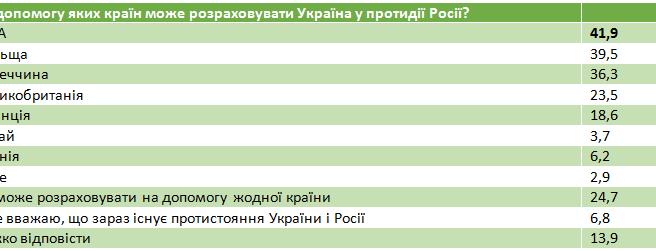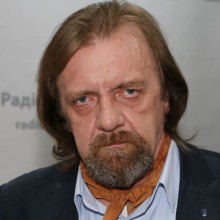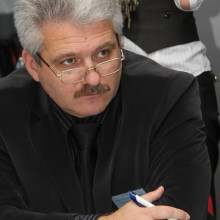June 2014 set two records: one in the considerable growth of the attractiveness of the European integration vector in the short term (up to 52.7%) and the other in the ultimate collapse of the opposite idea – that of joining the Customs Union (up to 16.6%).
Paradoxically, the peak of the wish to join the Eurasian project (52.5%) fell on the final months of the presidential term of the “pro-Western” V.Yushenko (average for the RF support – 31.5%, EU support – 43.4%) and steadily declined during the term of V.Yanukovych (average for the support of both vectors – at 36.6%).
Сlearly, the political blackmail and economic pressure from Russia on the eve of the Vilnius summit where the signing of the Association Agreement between Ukraine and the EU was planned, caused a further increase of the pro-European attitudes of the citizens. And after the Kremlin’s support of the bloody crackdown on Maidan and later of the Crimean and intervention in Donbas, they have completely turned away almost a third of the supporters of the so-called "Russian World".
62.3% believe that Russia is more interested in Ukraine's integration into the CU than our country, 19.6% agree with the idea of the mutual benefit, and only 3.4% believe that it is beneficial primarily to Ukraine. By comparison, the majority of the respondents (37.2%) described integration with the EU as mutually beneficial, and almost an equal number -- as being beneficial to both Ukraine (27%) and the EU (28.6%). Thus, Ukrainians are well aware of who initiates and gets dividends from the Eurasian project and prefer the European prospects.
The greatest support (the wish to strengthen the integration or to leave the cooperation at the same level) to the European integration has received in the Western and Central regions, 96.8% and 93.1%, respectively, followed by the Southern (65.8%) and Eastern (62.5%) regions. Only in the Eastern region, due to Donbas, we can see a certain anomaly when the number of the EU opponents (wanting to reduce or discontinue cooperation) is almost one-third - 29.9%. Wherein the negative attitude towards the European integration is ten times less in the Central region (3.1%) and twenty-five times less in the Western region (1.2%) comparing to the "eastern indicator" (29.9%).
However, the comparison of data for the Eastern region has uncovered an interesting phenomenon - its division into Donbas (Donetsk and Luhansk oblasts) and, conditionally, the New East (Dnipropetrovsk, Kharkiv and Zaporizhia regions). The number of
supporters of the European integration in the New East is twice (56.5%) that in Donbas (28%) while the ratio of those wanting to curtail it is inversely proportional (12.2% vs. 28.6%). Given the similarity of these areas’ historical backgrounds, it would be reasonable to believe that under the normal conditions the index of support to the European integration would have shown minor variations at the rate of a statistical error.
It is clear that the survey results were largely influenced by the monopolistic presence in the region of the Russian media propaganda, as well as by the reality of the antiterrorist campaign. For obvious reasons, the latter is negatively perceived by the population residing in the zone of the active combat operations. It can be assumed with certainty that the attitude of the vast majority of the euro-skeptics in the area of the ATO will begin changing as soon as the new realities start sinking in. Among those are: the new understanding of the "advantages" of living in the self-proclaimed "republics" led by armed terrorists, the disillusionment of the Crimeans in Russia's "paradise", a balanced information stream, the stabilization of the situation in other regions of Ukraine and return to normalcy in the Eastern regions of Ukraine liberated from terrorists.
An additional confirmation of the aberrative nature of this situation may be found in the ratios of the international vector support and public attitude to Maidan and anti-Maidan. The data shows that the level of public activity during the conflict earlier this year in the East and South was significantly lower than in the West and Center. I.e., in the South and East 54% and 43%, respectively supported anti-Maidan, while the number of Maidan supporters in the Center and the West was much higher - 63% and 80%, respectively.
The analysis of the available data allows us to conclude that the narrow marginal dominance of the integration with Russia over the European integration (4.5%) in the East is related to the above-mentioned factors, rather than reflects a consolidated public opinion, and thus, is likely temporary. For instance, in the South, where anti-Maidan was supported by a record number of the population (54%), the idea of the European prospect currently dominates over the Eurasian one (8.5%) and
obviously, as the security situation improves, that gap will grow not in favor of the Asian expanse.
Quite expectedly, the most interest to deepening the relations with Russia or maintain them at current levels are demonstrated by the Eastern (53.9% and 13.1%, respectively) and Southern regions (39.9% and 17.4%, respectively). The trend to reduce or stop such cooperation is visible in the Western (41.8% and 31.5% respectively) and Central (29.3 and 32.6% respectively) regions.
At the same time, while giving preference to the integration with Russia in the next 5-10 years (32%), 23.6% in the East support the European integration intentions, and another 26.4% consider it beneficial to deepen relations with both the East and the West. The Southern region is almost equally divided between the integration
with Russia and the EU (27.2% and 26.8% respectively), and 19.2% sympathize to both vectors. The Western and Central regions show a definite orientation for Europe (90.6% and 65.2%).
According to the survey, the most beneficial areas of cooperation with the EU include the legal (59.8%), technological (52.6%), investment and security (52.1%), with Russia - energy (27.4%), trade (21.3% ), economic (18.7%) and cultural (18.1%). Equally beneficial are considered such areas as science (28.6%), trade (35.3%) and energy (28.4%).
It is very telling that while comparing the advantages of Ukraine’s cooperation with the EU and Russia, the respondents not only preferred the EU, but also, that the numbers supporting the most promising areas of cooperation with Moscow are 1.5-2 times lower than even the lowest “European” numbers on the list.
That certainly suggests that if the respondents evaluate the pros and cons objectively and without undue politicization, European civilizationary expanse receives an unequivocal support.
Even in the humanitarian spheres (language, literature, history, religion, etc.) that are traditionally considered as strongly bonding Ukraine and Russia, Europe is more than twice as attractive as the Russian Federation (43.9% vs. 18.1% respectively), and 13, 7% more desirable than equal movement in both directions.
The interest level in cooperating with the EU in the fields of science and technology rather than with Russia, actually destroys the traditional myth of the Russian science and technology’s capabilities and prospects. Surprisingly, that assessment coincides with a number of the international rankings and studies that do not speak in favor of the Russian scientific and technological potential. In particular, among the 3215 scientists in the world whose research is being actively cited in the scientific community, there are only 8 Russian (3 of whom work abroad); a Russian University first appears on the list of the best in the 226th place; even among the BRIC and developing countries, the MSU occupies the 10th place after four Chinese, three Turkish, one South African and one Taiwanese school; in the amount of the scientific export Russia holds the 30thplace (Ukraine holds the 39th).
Despite the number of those who believe the cooperation with Russia and the EU is equally beneficial, the vast majority (62.9%) agree that Ukraine cannot maintain an equal distance with both. Only 18.1% believe that such an approach is possible.
The greatest threats to Ukraine, so to speak, in the case of joining the EU are perceived to be the illegal migration across the Ukrainian territory (14%), goods smuggling (12.7%) and drug trafficking (12.3%), while a much larger number of the respondents, 43.5%, 45% and 41%, respectively, to the contrary, see that these problems will decrease. According to the poll, the European integration would reduce the threat of terrorism (52.5%) and of arms trafficking (51.1%). Obviously, the latter values are caused by the terrorist and separatist activity in certain areas of Donbas.
A third of the respondents are confident that joining the CU will mean the increase in the threat of goods smuggling (33.7%), illegal weapons (33.4%), illegal immigration (33.2%), drug trafficking (30.9%) and terrorism (30 7%). The advantages of MS as seen by the respondents are incomparable in numbers: those who believe that the threats of terrorism, illegal weapons and human trafficking account for 20.7%, 17.4% and 14.5% respectively.
The practically mirror evaluation of the absence of threats to Ukraine from the EU (72.7%) and their presence from the RF (73%) speaks volumes. 59.3% and 60.9% respectively agree that NATO and the United States do not pose a threat to our country.
50.1% of the respondents consider the open information stream a threat. However, the threat is seen as the greatest from the side of Russia - 69.3%. With a large follow those who see the informational influence of the US (30.6%) and the EU (26.1%) as a threat. A quarter of the respondents (24.5%) believe that the strengthening of relations with Russia will improve Ukraine's security, while 42.7% strongly disagree. Almost twice as many respondents (47%) are in favor of intensifying the security part of the relationship with the EU, while 13.6% are against it. Even strengthening the relations in this area with the United States (39.6%) shows significantly higher numbers than the same relationship with Russia, only 20.8% believe that it would not contribute to our national security.
The measures that would contribute the most to our national security are deepening relations with the EU (47%) and the USA (39.6%). Even joining NATO (29.5%) exceeds support to deepening cooperation in the area of security with the Russian Federation (24.5%), and that is even without including the 23% of respondents who believe that NATO membership will contribute to the Ukrainian security to a certain extent. Wherein the level of rejection of the military-political bloc is at the level of 29.1%.
Responding to a separate question regarding the usefulness of Ukraine’s joining NATO, the vast majority (54%) agree with that with 27.8% of those considering that the application should be submitted immediately. Only 32.2% believe that Ukraine does not need join the alliance, and 13.8% are unsure.
Is there a so-called alternative to strengthening relations with the EU? Very telling is the answer to the question: "In the current environment, should we increase or decrease cooperation with the following states/unions: the need to deepen relations with the United States - more than half, while with Russia - almost one third. Thus, the need to reduce the level of relations with Russia insists more than a quarter of respondents, and the USA - only 13.8%.
Under the conditions of Russian aggression against Ukraine, it is the U.S. and not the major European states that are seen as those whose help our nation can really count on. 39.6% believe that strengthening relations with Washington will strengthen our security considerably and 29% - to a certain extent, while in regard to Russia the figure much lower - 24.5% and 21.9%, respectively.
Russia is seen as a threat to Ukraine three times (73%) as much as the U.S. (23.1%).
At the same time, 60.9% are confident that the U.S. is not a threat to our country - 60.9%, while only 17.8% believe the same about Russia.
Summary
The survey results give grounds to state that Ukrainians, who consider themselves an integral part of the European civilization, have clearly made their choice as to the country’s strategic vector of development. The preference of the European integration in the short run is proved not only by the considerable -- a record for the last 12 years--support of the respondents (52.7%), but also by the further drop of the already low level of support for the Russian projects (16.6%), together with an awareness that the entry of Ukraine into the Customs Union would benefit Russia a lot more (62.3%) than Ukraine (3.4%).
The evidence that the European choice is primarily a choice of values, lies in the number of the respondents who expect the most benefits from cooperating with the EU to be in the legal area (59.8%). That is not surprising since the idea of the rule of law clearly resonates with the values of "The Revolution of Dignity" that can be formulated as freedom, justice and prosperity, and precisely in that order. Other areas of greatest interest are investment (57.9%) and technology (52.6%).
The Western and Central regions lead in support to joining the EU (96.8% and 93.1%, respectively). Only "thanks" to Donbas in the East we can observe a certain anomaly when the number of skeptical attitudes to the EU comprises almost a third (29.9%). However, the analysis of the Eastern region data has uncovered an interesting phenomenon -- its division into Donbas and conditionally, the New East. The number of supporters to the European integration in the New East is twice as high (56.5%) that in Donbas (28%), while the ratio of those wishing to curtail it is inversely proportionate (12.2% vs. 28.6%, respectively). Given the historic commonality of these areas of the East, it is logical to assume that under normal circumstances, the support to the European integration would have minor fluctuations around a statistical error rate.
What proves that is the evidence that when the respondents evaluate the pros and cons of the EU integration without undue politicization, the European civilizationary expanse undoubtedly wins. It is further confirmed by the fact that when comparing the advantages of cooperation with the EU and the RF, the respondents not only preferred the EU, but also demonstrated the numbers of those supporting the most promising areas of cooperation with Moscow to be 1.5-2 times lower than even the lowest “pro-European” numbers on that list.
Excluding the temporary "eastern anomaly", the Eurointegration idea is supported by the overwhelming majority of the citizens. The gives reasons to claim with certainty that the European perspective plays a consolidating role. Ukraine is united both in its desire to return to the European family and in its rejection of the Eurasian project, in other words, Ukraine is a united country!
Ukrainian estimate the level of threats from the EU as considerably low, while a third of the respondents is confident that joining the CU would increase the threats of goods smuggling (33.7%), illegal weapons (33.4%), human trafficking (33.2%), drug trafficking (30.9%) and terrorism (30.7%).
The practically mirror evaluation of the absence of threats to Ukraine from the EU (72.7%) and their presence from the RF (73%) speaks for itself. 59.3% and 60.9% respectively agree that NATO and the United States do not pose a threat to our country. And under the conditions of Russian aggression against Ukraine, 41.9% count on the help from Washington, while 39.6% are certain that strengthening relations with the US will strengthen our security considerably and 29% - to a certain extent. Thus, the United States is regarded as an extremely important and reliable partner, as well as a significant security factor for the Ukrainian state, possibly as an alternative to the EU in this area.
A quarter of the respondents (24.5%) believe that strengthening the relations with the RF will improve Ukraine's security, while 42.7% strongly disagree. Almost twice as many respondents (47%) are in favor of intensifying the security part of the relationship with the EU. Even joining NATO (29.5%) exceeds the support to deepening cooperation in the area of security with the Russian Federation (24.5%), and that is even without including the 23% of respondents who believe that NATO membership will contribute to the Ukrainian security to a certain extent.
Ukrainians are fairly pragmatic in their attitude to the EU, and see the European integration more as a useful tool for change life for the better, than the strategic goal of the national policy. However, a significant support level for such a direction implies the willingness of people to undergo urgent and radical, and therefore painful, reforms. So, the Ukrainian political elite that has filled the power vacuum in the country rather than gained victory in a struggle, has yet to meet the high public expectations regarding changes in the key areas of life. As of now, it has received a mandate of trust for the radical of the whole system of the social and political relations, economics and so on.
Signing the agreements with the EU is already a historical fact; from now on, only the concrete steps for their implementation and the changes of life for the better will meet the expectations of the people. Otherwise, a disappointment both in authorities and the direction itself will have disastrous consequences.
In other words, the society must obtain a clear integration strategy. In addition to that, it is necessary to create the appropriate institutional mechanisms of implementing the agreements, provide the necessary human and other resources, as well as the wide coverage of the integration process itself. That information component is exceptionally important since besides simply updating the people on the course of the agreement implementation, it is crucial to advocate the European vector and thus, counter the massive Russian propaganda aimed at creating a self-serving picture of the world and keeping Ukraine within its geopolitical orbit. A separate task is lobbying the idea of rationality of Ukraine's membership in the EU with the member states of the union, especially those skeptical of the idea.
All social groups have to be well-informed of the integration and the reforms, and feel the results even better. The introduction of a visa-free regime should become an important step in this direction.
In order to maintain a high level of “Euro-enthusiasm”, the authorities, together with the help of the public sector, should include into the strategy targeted at an "average Ukrainian" the following measures:
• development of the cross-border transport infrastructure • improving the conditions of the border entry, • liberalization of the airline market (budget flights) • promotion of the bus connections, • exchange programs, especially for pupils and students, • creation of the information resources on the possibilities that exist for Ukrainian citizens in the EU • tourism support and so on.
At present, the Ukrainian state is at a bifurcation point, and largely depending on the actions of the current government, it will either the transition onto a qualitatively new level of existence, or else...


























